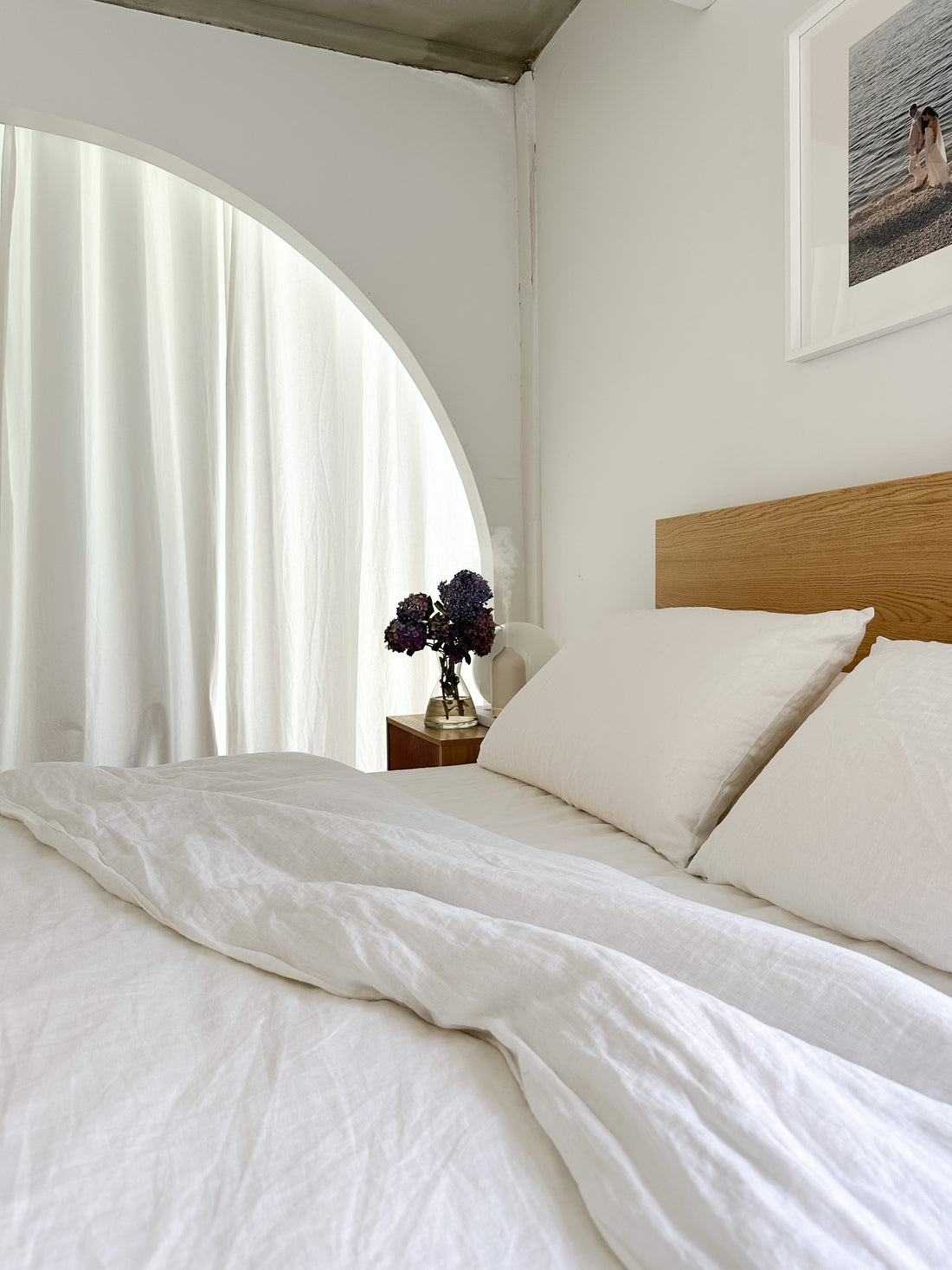If you struggle to get a good night’s rest, the remedy may be closer to home than you think. Before reaching for sleeping pills or potions, making small adjustments to your bedroom to create an ideal environment for sleep may make the world of difference. How we decorate our bedrooms, use them, and even our attitude towards them can make or break our sleep cycles.
Luckily, there are many simple changes you can make, and start making today. In this article, we provide 6 ways to transform your bedroom into the perfect haven for sleep.
But first, we believe one of the biggest motivators for change is understanding the reason why you’re doing it! We know sleep is important, but just how important is it?
The impact of sleep
If you think you can function ‘just fine’ off of 5 hours of sleep per night, we encourage you to think again. As much as sleep is essential for our overall well-being, other life factors often tend to creep above it on our ladder of priorities. Whether it’s chipping away at some more work from the day, getting carried away with cleaning and chores, or getting sucked into your favourite TV series, it’s all too easy to convince ourselves that sleep can take a backseat to whatever activities that you’re preoccupied with in the later hours of the night.
Understanding just how much of an impact sleep makes on your health and quality of life may help motivate you to adjust your priorities! Here are just a few:
- Mental health: Getting a good quality sleep each night is essential for maintaining our baseline mental health. Chronically poor sleeping patterns have been associated with depression and anxiety, but even one night of poor sleep can have a significant impact on your state of mind the next day.
- Cognitive function: A lack of sleep interferes with our ability to think, focus, and remember things.
- Physical development: Sleep impacts our physical health as well. Physical recovery, brain development, cardiac function and body metabolism all require the functions that our bodies perform while we sleep.
How to create an ideal sleep environment
1. Reduce clutter in the bedroom
A cluttered space means a cluttered mind, and constantly stepping over piles of clothes and laundry can lead to frustration as well. To wind down and receive a deep, quality sleep, you want to make your bedroom as stress-free as possible, and decluttering your room is a wonderful first step to naturally evoke more peace and calm. Keep your floor, bed and surfaces as clear as possible and you will start to feel the effects reflect in your state of mind.
2. Consider aromatherapy
We’re striving to please all five senses, and smell is not one to be left out! Lighting candles and incense can help create an incredibly calming ambience without needing to make any drastic changes to the state or set-up of your room. To take this one step further, diffusing essential oils not only ticks the box of creating a heavenly-scented room. There are over 90 varieties of essential oils, each harbouring its own health benefits. Helping decrease stress and anxiety, remedying headaches, reducing inflammation, boosting your mood and improving your sleep are just a few of the incredible benefits you can reap from diffusing essential oils.

3. Choose your bedding mindfully
Now, to the focus point of the room: your bed. Choosing bedding that makes you feel cosy, calm and comforted helps your ability to wind down and enter a state of true relaxation. And in a world where we’re constantly chased by digital notifications and reminders of our never-ending to-do list, every little bit counts! One of our personal favourites is the Bed Threads range of French Faux Linen bedding. Perfect for every season, this material will keep you cool in summer and warm in winter, so you can’t go wrong!
4. Lighting
Sleeping in complete darkness is an important cue for our circadian rhythms. Often referred to as our ‘body clocks’, this system within our bodies regulates our sleep cycle. Pitch darkness is a powerful way to trigger your body’s internal cues that it’s time for sleep. However, as you wind down leading up to bedtime, you can use soft lighting to help prepare your mind and body for rest. Salt lamps, candles and sunset lamps are some simple ways to create a warm and gentle atmosphere that invites comfort and relaxation.
On the same note, avoiding screens for 1 - 2 hours before going to sleep is strongly recommended. The blue light that our device screens emit stimulates our brains, interrupts our bodies’ circadian rhythms and interferes with the secretion of melatonin, the hormone our body produces to fall asleep.

5. Set the room temperature
A comfortable temperature for sleeping is said to be between 15.6 and 22.0 degrees Celsius. As being too hot is more likely to interrupt your sleep, it’s recommended to err on the cooler side. If you’re someone who likes being snuggled up under a doona, ensure that you wear lighter pyjamas, switch on the fan or open a window to ensure you don’t end up cooking in bed!
6. Treat your bedroom with purpose
Your attitude towards your room and how you treat it impacts your ability to feel relaxed in it. If you treat it as a partial work space, exercise space and entertainment space, the emotions and energy of those activities will become associated with your bedroom as well. Instead, the bedroom should be for two purposes only: sleep and romance. Isolating this space for those purposes allows you to escape from any other part of your life or your day to truly recharge.
Adjusting your sleeping space doesn’t have to be expensive or time-consuming. Simple changes in our environment can have powerful repercussions for our physical and mental states, and these are all things that you can start doing today. Paired with a purposeful bedtime routine and good sleep habits and hygiene, these simple changes will start making the world of difference to your quality of sleep.






